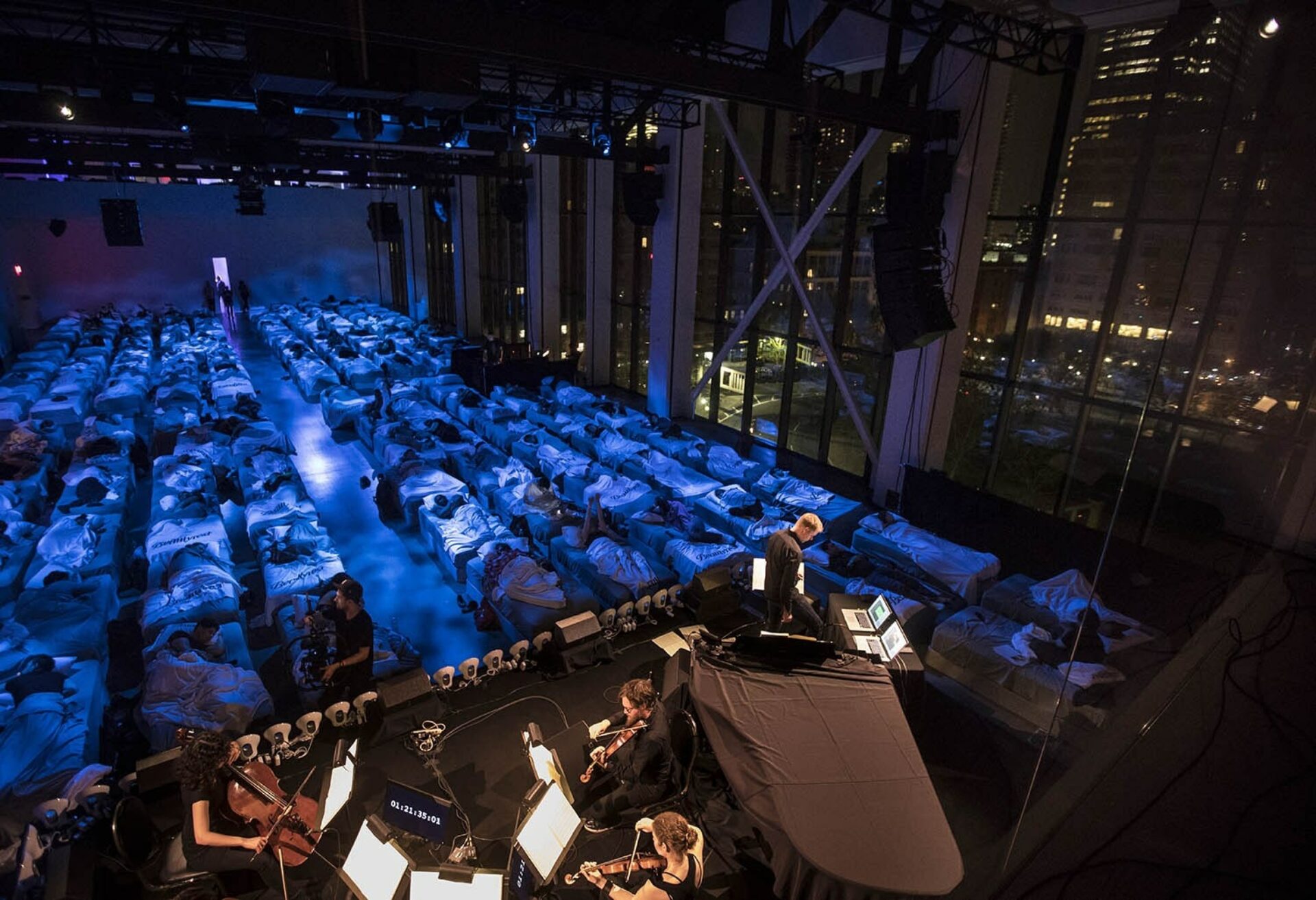Max Richter's Sleep is a documentary made to preserve and promote an artwork most viewers won't personally have experienced, and which even those who paid money to see it live will likely have nodded on and off through. Before you take that as a damning assessment of its qualities, know that any such snoozing was the exact response its creator intended. Running a full eight-and-a-half hours, and generally performed as twilight gives way to darkness, Sleep was conceived so as to help the listener catch a few zzzs here and there - which arguably only makes it worthier of close study amid the restless nights of 2020. The composer is Max Richter, the well-spoken Brit best known for his film scores (Shutter Island, Arrival), who here gets to talk newcomers and long-term admirers through his philosophy, the genesis of this specific piece, and what it might represent in the wider context of the world. To some degree, it seems, Sleep might be approached as a musical equivalent to slow cinema or slow cooking. As that world speeds up exponentially, to the benefit of big business if not necessarily the individual, this extended piece (which we learn Richter has been tinkering with for several decades now) provides a way for the listener to stretch out, take an eye off the clock and let down one's guard - those circumstances that have traditionally inspired overburdened humanoids to switch off for the evening.
Appropriate, then, that after an initial burst of drone-heavy ambient scenesetting, Natalie Johns' film should take on a gently lulling quality, all low lighting and measured pans around cities in the course of putting their heads down for the night. Factor in the music, and it wouldn't surprise me if matinee and late-show viewers found themselves succumbing to multiple micronaps. What will they miss? Some considered discussion of craft, for one: an eight-hour piece means there are plentiful notes and movements to be accounted for, and Johns sporadically takes a step backwards - taking care to avoid drowsy concertgoers - to describe how Richter got to staging these big nights out in high-profile venues. To its credit, this is one of the few recent arts docs to bring up the matter of money, and to address - at least in passing - the scrapes and sacrifices made earlier on so that Richter and his wife/creative director Yulia Mahr could inhabit the well-appointed property we find them in. Yet as you'd expect from a film produced by Mahr and Richter's record label Deutsche Grammophon, some of this tips over into unenlightening fandom ("Max's music cleans your soul," gushes one admirer), and approximately a third of the running time is made up of shots of people nodding off: not necessarily the most dynamic imagery, deployed as screenfiller while the soundtrack is doing the heavy lifting.
Clearly, I'm far from Sleep's target audience: I write both as someone who needs something close to total silence to get anything like a satisfying night's shuteye, and someone who finds the idea of dragging a sleeping bag along to an outdoor venue in order to sleep in public - surrounded by other people - little short of terrifying. (Those interviewed insist that this is a reinvigorating collective experience, to which I say: all very well, I just hope your wallet, phone and shoes are still there come sun-up.) I kept wanting Johns to dig a little deeper into the logistics of such an event, and to ask the (perhaps literal-minded) questions that might have offset the hushed dreaminess of this endeavour. What do you do if you need the loo? Given the shared intimacy - a hundred or so cribs lined up in close proximity - do people hook up at these concerts? Given the rigours of modern employment law, does the (relatively small) orchestra get a break at any point? What's everybody doing for breakfast? (You may have visions, as I did, of some opportunistic burger van pulling up outside the venue at five a.m., the noise of the generator and smell of onions rather taking the New Agey edge off the dawn chorus.) But no: we're left with what's effectively a taster of/promo for the more immersive Sleep Live, designed to give ticket sales a boost whenever Richter is next able to take this show out on the road. It's an aptly relaxing watch, if also prone to a Sky Arts-ready tastefulness that is, in its own way, soporific.
Max Richter's Sleep is now playing in selected cinemas, and available to rent via Prime Video and Curzon Home Cinema.

No comments:
Post a Comment